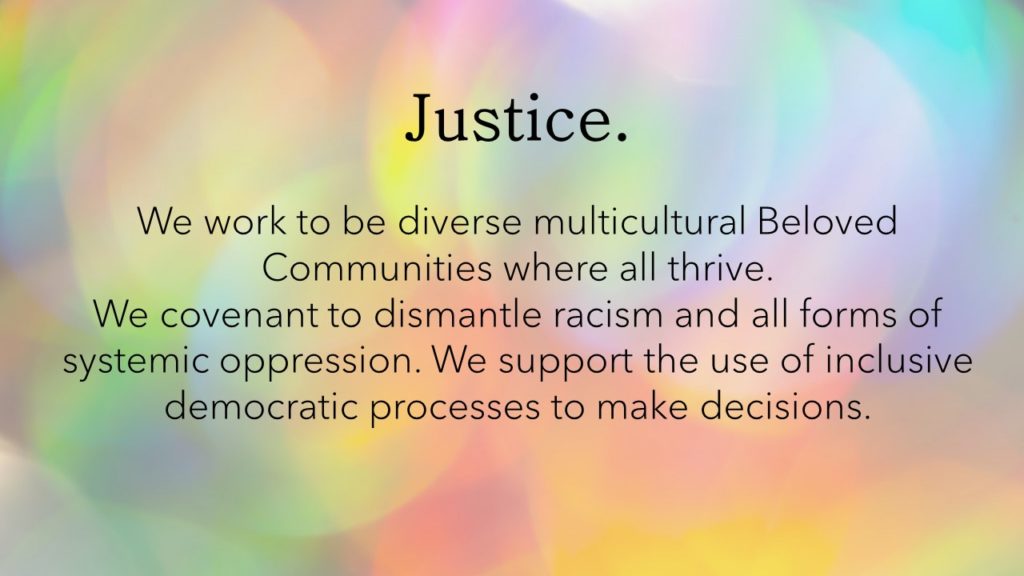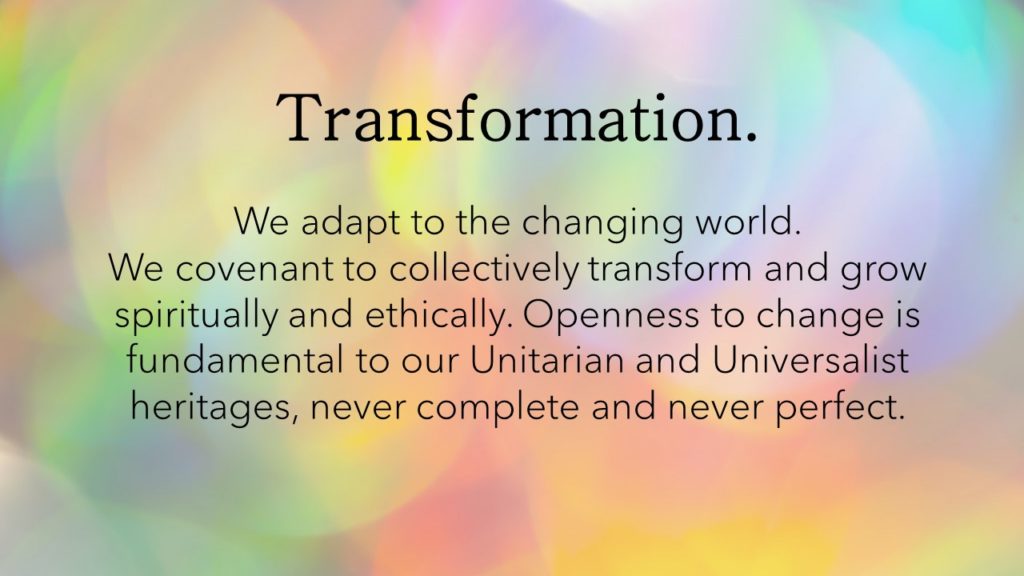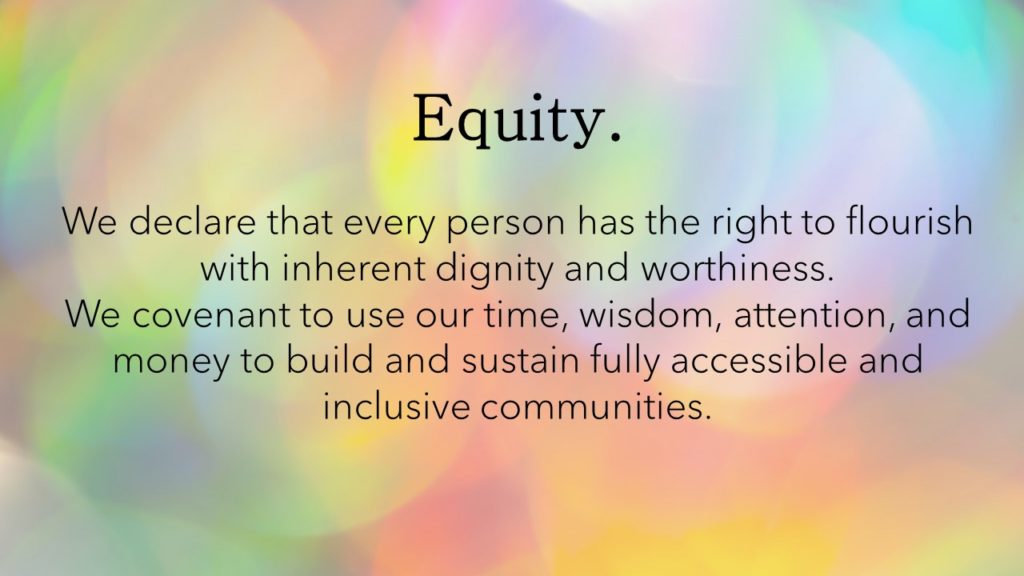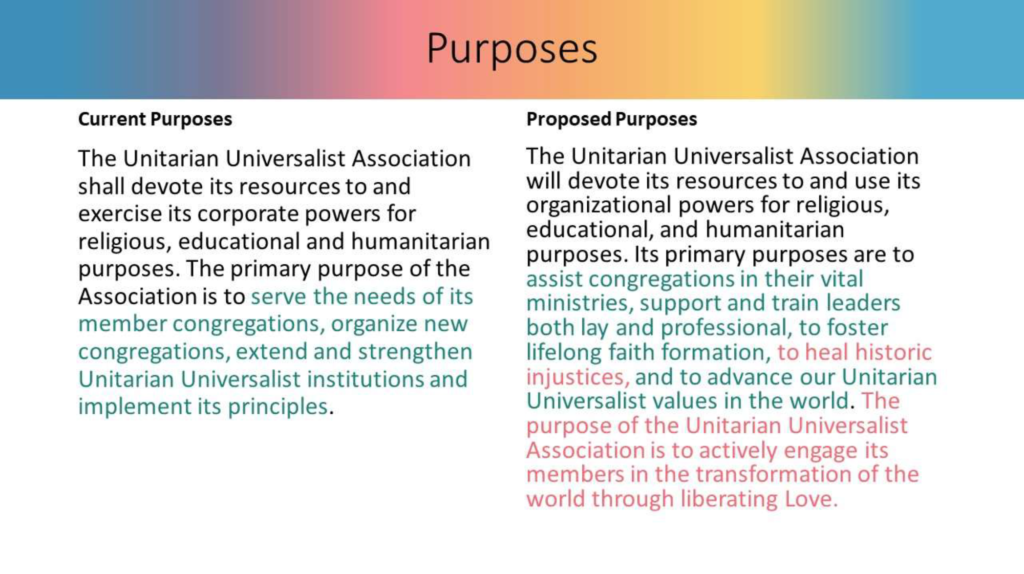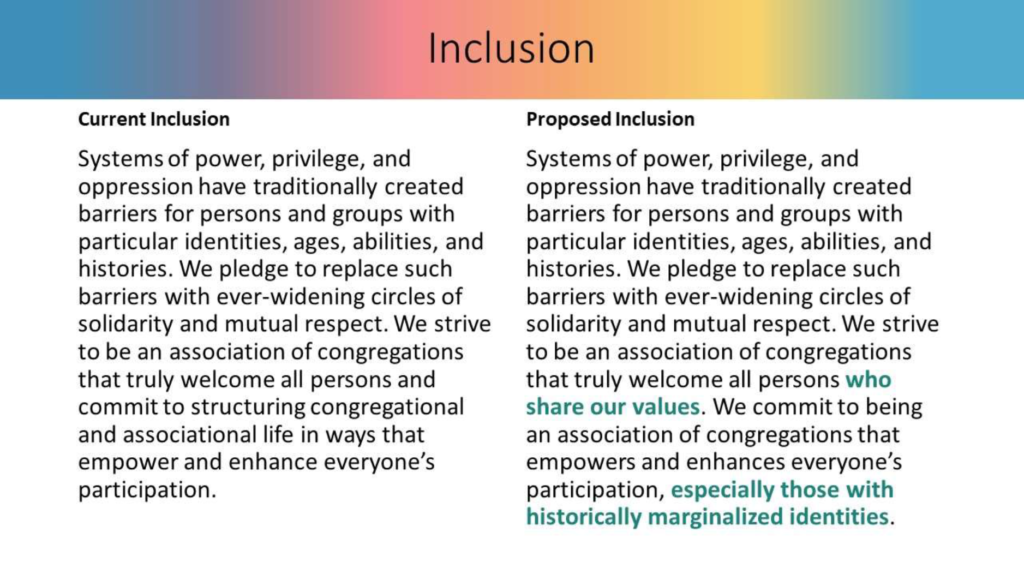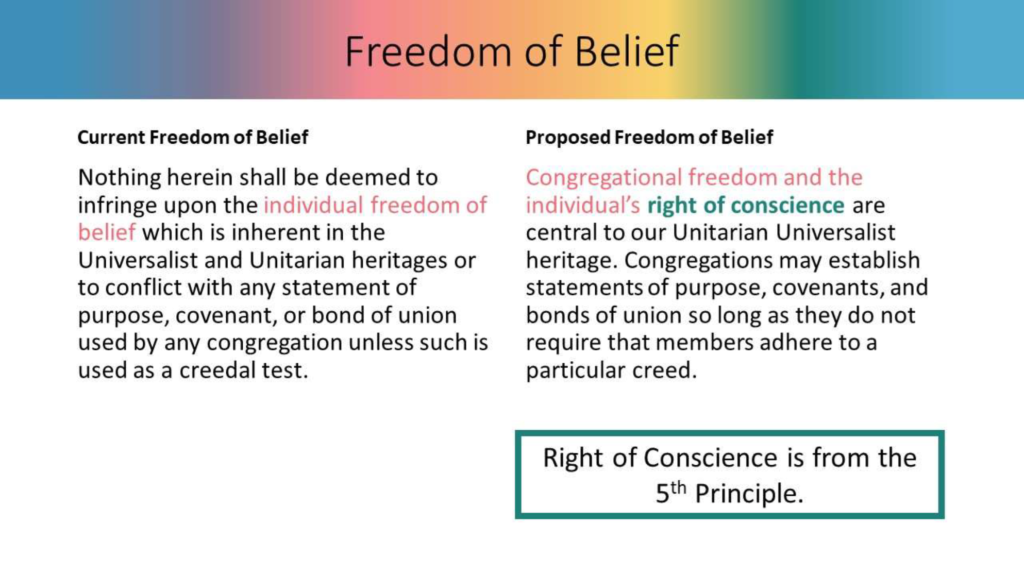Our Living Tradition – Re-imagining Article II
READING ~ “The Way It Is” by William Stafford[1]
There’s a thread you follow. It goes among
things that change. But it doesn’t change.
People wonder about what you are pursuing.
You have to explain about the thread.
But it is hard for others to see.
While you hold it you can’t get lost.
Tragedies happen; people get hurt
or die; and you suffer and get old.
Nothing you do can stop time’s unfolding.
You don’t ever let go of the thread.
READING ~ from the introduction to the UUA Article II Commission Report – January 2023
Article II of the Unitarian Universalist Association (UUA) Bylaws, Principles and Purposes, is the foundation for all of the work of our UUA and its member congregations and covenanted communities. It is the covenant to which all of our congregations and covenanted communities pledge themselves when they become members of our UUA.
SERMON “Our Living Tradition – Re-imagining Article II
Our first reading this morning is one I shared with you a month ago when my topic was “The Path of Love” when I reminded us that Love is now and has always been at the very center of our Unitarian Universalist faith. William Stafford’s poem “The Way It Is” uses the image of the thread as the thing that holds. Everything changes. We don’t let go of the thread. For us, the thread is Love. We hear this word again throughout the work of the UUA Article II Commission. – The Center is Love and the Center Holds. This has been true since the very beginning of Unitarian Universalism in 1960. Before I go into detail on the new version of our UUA By-Laws Article II, I want to go back – back to our first version of what holds us together as a religion and as a faith that is a LIVING faith – remembering the words of Rev. Fisher, “We don’t stand, We move.”
Our living tradition calls us to be ever mindful of the times in which we live and to craft a faith that speaks to the hearts, minds and spirits of all who live in these times. That means that language, images, theologies, covenants, expectations and missions change; they evolve and grow and inspire each generation anew. And so, we return to our UU Principles, Purpose, Sources of faith and ways of doing religion together from time to time. In fact, our first set of by-laws adopted with the creation of Unitarian Universalism and the UUA set in place a requirement that the member congregations of our Association review and revise as necessary our Article II purpose and principles every 15 years. We have reviewed and revised them several times through our 70 years. We are doing so again now.
So, here we go. I am deeply grateful for the work of my colleague The The Rev. Dr. Cynthia Landrum, minister of the First Parish Church of Stow and Acton, MA. for the slides I will share with you this morning. She did a whole lot of work on presenting the new Article II and immediately shared it with everyone.
At the center of our faith is Love. Each of us will understand love in our own way. In common, we hold that love is stronger than hate and stronger than fear. We respect the inheritance of scripture from Jewish and Christian teaching that the greatest commandment is to love God and love our neighbor. We take this commandment seriously as we work through our faith for justice and a world where everyone may thrive. So, keep looking for evidence of this core truth and value as we make our way through history and to the present version of UU Values and Covenants.
In 1960, the newly formed UUA adopted a set principles. This was not an easy task. There was argument and dissention and editing and re-editing and finally coming together. Not everyone was totally happy. But, we agreed to move forward.
Listen carefully to the language, theology and images of our 1960 version.
What do you notice? There are familiar ideas here. There are strong references to our free faith and our commitment to transforming the current world into a better world. The language, however, is typical of its time and male gender vocabulary is used throughout.
UU women, and plenty of men, began in the 1970s to question the relevance of this document for them and for the times. They made noise. They called for a review and revision of Article II. It took several years to adopt a new set of principles in 1985. Again, not without argument, dissent, even some rancor. But, in the end, we came together to adopt these principles.
Sound familiar? This version is what we have today. Another big change for our UUA congregations was the addition of our SIX SOURCES. I don’t have a slide for these sources, but you’ll find them listed in the front of our gray hymnbook and on almost every UU congregation’s web site.
The 20th Century ends with many UUs feeling left out of our faith’s central theologies, structures and our principles. Traditionally marginalized groups began to make noise; to ask for better language, images and theologies that included them – not as an after thought, but at the center. LBGTQIA+, Black Lives Matter , and other marginalized folks come to Unitarian Universalism because of our saving message of love and dignity for ALL people, our emphasis on justice, and our open minded open hearted search for truth and meaning. Upon arrival, many soon discovered that our aspirations exceeded our actions. Time to make a thorough review and revision of the principles and covenants that we hold dear. The questions were being asked – what is vital to a 21st Centiry faith that is missing from our statements? – Who is not being represented adequately? – How do we appeal to those who would come to Unitarian Universalism if we made a more honest and direct appeal to them and their faith orientations?
One significant effort to include what has been missing is the proposed 8th Principle. This principle has been written and revised and edited to the last degree. Several years and many, many people have been involved. Here is the proposed 8th Principle which takes seriously our commitment to anti racism & anti oppression.
This principle has not been adopted by our member congregations by a vote a General Assembly – not yet. That may happen soon. Hundreds of congregations have discussed this principle and many have voted to affirm and adopt it.
Our congregation has not had much discussion about this 8th principle.
If there is interest, we will. I have my own personal opinions about it – which I am willing to share if asked. I like it and I don’t like it. A rather typical UU sort of reaction.
The work of the 8th principle is not part of the work of the UUA Article II Commission. The 8th Principle was already in motion and under consideration in congregations when the UUA Board determined that the time to review and revise all of Article II is now. That work began in 2020. So, here we are in 2023. The Article II Commission has done its work and made its report to the UUA Board. It is published and available to everyone. It is fascinating.
What we have before us is not merely tweaking or revising of our current Principles and Purpose. It is a complete re-imaging of what our faith now – a living and moving faith – has to say about ourselves. Long sentences are out. Bulleted lists are out. Alphabet lists of everyone we have ever met are out. What we have been offered is a covenant, a purpose, shared values, and sources of inspiration for faith, truth and meaning.
Before I put up the slides of the new, let me say a few personal things about our current purpose, principles and sources.
I came into Unitarian Universalism in the late 1980s. I immediately fell in love with our 7 principles and 5 – soon to become 6 – sources. I have been guided and inspired by what UUs say about who we are, how we relate to each other, and how we interact with our world. No matter how our association votes on the proposed revisions, I will always treasure and keep in my heart, mind, and soul the version that brought me into this faith. We do not throw away our past. We treasure it for what it meant at the time. Things naturally become more a part of our history than our present. This is good and right. So, for me, there is a very real sense of loss, even grief, when I consider setting aside what we have now in order to embrace and adopt what lies in our future. Our closing hymn this morning is the hymn that was written at the time of the union of Unitarians and Universalists. The third stanza says this:
A freedom that reveres the past, but trusts the dawning future more;
and bids the soul, in search of truth, adventure boldly and explore.
So, I am prepared to discuss and consider and argue about words and phrases that are there and that are missing from the new version.
I am not yet ready to say yea or nay. I am ready to engage the process.
You are invited to engage too. I hope you will. Here we go with the new!
Instead of a list of principles, we are seeing a set of shared values. The presentation is graphic rather than verbal. It is simple – for better or worse. These values appear as a pinwheel or flower with six petals surrounding the core value – LOVE. There is no particular order. You jump in anywhere and go to whichever value catches you in the moment.
This graphic might be a little hard to see on the screen. You can find it in today’s Mail chimp email and you can get it from the Commission’s report.
There is a brief statement of meaning followed by a covenant for each value. I want you to notice two things. One, we use action verbs – we are covenanting to DO our work in the world. Two, there is a built-in sense of accountability. UUs are often criticized for being able to talk about what needs to be done until well into the wee hours and never quite getting around to the doing. This version of our values and covenants seeks to move us toward action and accountability.
Rev. Dr. Cynthia Lundrum says this about our prosed revisions:
“When I think back on what is important in the Principles to me, and what is important in Article II, most of what I would’ve said I love is still there. The Principles for me, what’s important about them, is all embedded in there. And there’s not much I disagree with, particularly if we change it from we Unitarian Universalists covenant to this, to we the congregations covenant to this. There’s space in Unitarian Universalism, for our disagreement, and it’s still right there at the end, that this is not a creedal test. This is not your creed. You can have disagreement, and yet this can still hold us together.
Look back at what you said was most important. Was it respect? Community? Inclusion? Worth and Dignity? Interdependent web? Welcoming? Equality?
And is maybe some of it a little more there than it was before – Values, Pluralism, Generosity, LOVE? And can you open your heart to the possibility that what you need is still there, but this is something more for someone who needs that too? That’s what I’m working on for myself to try to do. I invite you to do so too.”
There is so much more to this revision than I can cover with you this morning. Seriously, engage with the process. Think through what YOU value about this living, moving, life-saving faith.
Imagine talking with someone about your faith and when asked, “Well, what’s it all about?” answering by saying, “Well, we have a set of shared values and covenants that guide us and hold us together. They are Generosity, Transformation, Equity, Justice, Interdependence, Pluralism, and LOVE – at our very center is LOVE. My faith is all about loving my one wild and precious life and this beautiful world and everything and everyone in this world.”
Works for me. I’ll keep talking and thinking and ruminating about the proposed changes. I’ll watch for the many amendments that are being proposed by individuals and congregations. We’ll get to talk about all that too in the coming months. AND – ready or not, I’ll be voting with all the thousands of delegates to this year’s General Assembly in June.
Let me know what you’re thinking. Talk amongst yourselves.
This is our Living Faith and we are centered in LOVE. Let’s help make it the very best faith we possibly can.
Our lives and the lives of so many others depend on it.
Blessed Be. I Love You. Amen.
[1] William Stafford, “The Way It Is” from Ask Me: 100 Essential Poems. Copyright © 1977, 1998, 2014 by William Stafford and the Estate of William Stafford.











